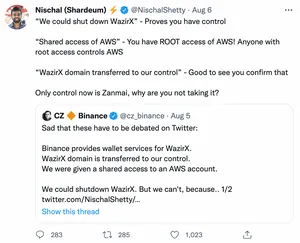The U.S. Office of Foreign Assets Control (OFAC) added Tornado Cash to its SDN list: a list of "Specially Designated Nationals And Blocked Persons" with whom U.S. individuals and organizations are prohibited from doing business.Tornado Cash is the most prominent cryptocurrency tumbler (or "mixer") and has been used in a multitude of instances to launder proceeds from cryptocurrency hacks and scams. In a press release, the Treasury Department named the North Korea-sponsored Lazarus Group's $625 million hack of Axie Infinity in March, the $100 million theft from Horizon Bridge in June, and the $190 million hack of the Nomad bridge in August as contributing to the decision.
Although Tornado Cash had claimed to be complying with sanctions in the wake of the Axie hack, the Treasury Department wrote in their press release that, "Tornado Cash has repeatedly failed to impose effective controls designed to stop it from laundering funds for malicious cyber actors on a regular basis and without basic measures to address its risks".
Tornado Cash is also widely used to maintain privacy in a world where transactions are publicly visible, and it remains to be seen how the cryptocurrency ecosystem will react to this major development. Tornado Cash is also relatively decentralized in its operations, meaning it may be difficult for the sanctions list to be kept up to date and for the sanctions to be enforced.
The fallout from the sanction was swift: in the days following the action, Tornado's source code repository was removed from Github and the accounts of some of its developers were suspended; the project's Gitcoin funding page was taken down; and the project's own website, governance pages, and Discord server went offline.










